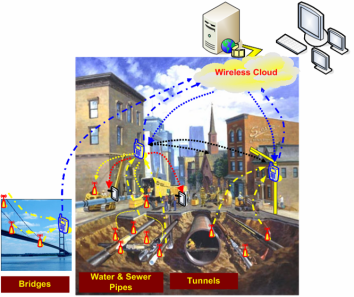Dr Kenichi Soga, Dr Campbell Middleton, Professor Robert Mair and Dr Peter Bennett are part of a team who have been awarded £1.4 million from the EPSRC 'Wired and Wireless Intelligent Networked Systems' (WINES) research grant to fund a 'Smart infrastructure' project.
One of the greatest challenges facing civil engineers in the 21st century is the stewardship of ageing infrastructure. Nowhere is this more apparent than in the networks of tunnels, pipelines and bridges that lie beneath and above the major cities around the world. Much of this infrastructure was constructed more than half a century ago and there is widespread evidence of its deterioration. Tunnels, particularly old ones, are prone to being influenced by activities such as adjacent construction, for instance piling, deep excavations and other tunnel construction. Excessive leakage and pipe bursts are frequent and usually unanticipated. Importantly, underground structures often cannot be inspected when they are being used by trains or due to other physical constraints. Bridges are susceptible to corrosion from de-icing salts and subject to ever increasing demands as the legal weight limit of lorries has been progressively increased over the years. Vehicular impacts and scour to the foundations of both road and rail bridges have resulted in significant loss of life and major disruption to strategic supply and distribution links. Little is known of the long-term performance of such infrastructure. These uncertainties and the importance of safety to users and consumers prompted the initiation of recent research projects investigating the prospect of damage detection and decision making and the use of novel sensors to mitigate damage.
Future monitoring systems will undoubtedly comprise Wireless Sensor Networks (WSN) and will be designed around the capabilities of autonomous nodes. Each node in the network will integrate specific sensing capabilities with communication, data processing and power supply. The project will demonstrate how large numbers of sensors can be integrated into large-scale engineering systems to improve performance and extend the lifetime of infrastructure, while continuously evaluating and managing uncertainties and risks. This is a joint project between the University of Cambridge and Imperial College London and comprises an integrated research program to evaluate and develop prototype WSN systems. Dr Soga is the overall project leader and Drs Ian Wassell and Frank Stajano of the Computer Laboratory (formerly Department of Engineering academic staffs) join the project as communication/security experts. The Imperial College London team consists of experts in water supply, communication and computer science. The main objective of this proposal is to develop generic/pervasive wireless sensor networks that allow sharing of equipment and communication tools for monitoring of multiple types of infrastructures. Three application domains will be studied in detail: (i) water supply systems, (ii) tunnels and (iii) bridges. The project will exploit common characteristics of different infrastructures to advance sensor network design. The complexity of the monitoring system requires the following research areas to be explored : sensor systems, wireless communications, autonomous systems, information management, programming and design tools, trust security and privacy, systems theory, human factors and social issues. Field trials will be carried out with London Underground Ltd., Thames Water, Yorkshire Water, Highways Agency and Humber Bridge. Intel Corporation will support the project with hardware for the trials.


